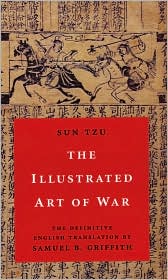The Art of War, by Sun Tzu
Aug 24
2010

One of my goals for this summer was to read Sun Tzu's The Art of War. I'd like to say I had some noble purpose in mind, but the truth is I'm just a huge, huge nerd—I wanted to hone my war-mongering mojo before next month's release of Sid Meier's Civilization V. I've been playing Civilization since elementary school, and I am so tired of having my peaceful, scientifically advanced civilizations harassed by more warlike nations.
For those of you who had the same kind of weak-on-world-history education I did, here's the lowdown on The Art of War: a few centuries before the birth of Christ, a Chinese general named Sun Tzu wrote a series of 13 short, surprisingly readable essays devoted to the various aspects of warfare. Topics included offensive strategy, military disposition, terrain, and the use of spies, and the chapters are filled with highly quotable maxims like "Know the enemy and know yourself; in a hundred battles you will never be in peril", "All warfare is based on deception", and (my favorite) "Offer the enemy a bait to lure him; feign disorder, and strike".
There is considerable debate over whether or not Sun Tzu was a real historical figure, and if so, when he wrote his essays and which sections of them are authentic. (Bits of chapter eleven seem sketchy, apparently.) Some questions were answered when ancient bamboo fragments of the text turned up during a Chinese archeological dig the early 1970s, but more were raised, further complicating an argument that's been rolling on since the eleventh century.
But all of this scholarly quibbling pales beside the real question: is reading this sucker going to improve my Civ game? Happily, I think it will. My edition of The Art of War* features promotional blurbs from publications ranging from the Marine Corps Gazette to Boardroom Reports, and with good reason—Sun Tzu's advice is applicable (with some modifications, like taking out the stuff about beheading concubines) in almost any scenario that requires strategic planning, be it business management, surviving high school, or absolutely crushing one's enemies in Civilization V.
*Translation by Samuel B. Griffith.
For those of you who had the same kind of weak-on-world-history education I did, here's the lowdown on The Art of War: a few centuries before the birth of Christ, a Chinese general named Sun Tzu wrote a series of 13 short, surprisingly readable essays devoted to the various aspects of warfare. Topics included offensive strategy, military disposition, terrain, and the use of spies, and the chapters are filled with highly quotable maxims like "Know the enemy and know yourself; in a hundred battles you will never be in peril", "All warfare is based on deception", and (my favorite) "Offer the enemy a bait to lure him; feign disorder, and strike".
There is considerable debate over whether or not Sun Tzu was a real historical figure, and if so, when he wrote his essays and which sections of them are authentic. (Bits of chapter eleven seem sketchy, apparently.) Some questions were answered when ancient bamboo fragments of the text turned up during a Chinese archeological dig the early 1970s, but more were raised, further complicating an argument that's been rolling on since the eleventh century.
But all of this scholarly quibbling pales beside the real question: is reading this sucker going to improve my Civ game? Happily, I think it will. My edition of The Art of War* features promotional blurbs from publications ranging from the Marine Corps Gazette to Boardroom Reports, and with good reason—Sun Tzu's advice is applicable (with some modifications, like taking out the stuff about beheading concubines) in almost any scenario that requires strategic planning, be it business management, surviving high school, or absolutely crushing one's enemies in Civilization V.
*Translation by Samuel B. Griffith.
Posted by: Julia, Last edit by: Julianka
No new comments are allowed on this post.
Comments
No comments yet. Be the first!